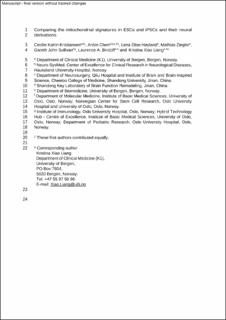Comparing the mitochondrial signatures in ESCs and iPSCs and their neural derivations
Kristiansen, Cecilie Katrin; Chen, Anbin; Høyland, Lena Elise; Ziegler, Mathias; Sullivan, Gareth John; Bindoff, Laurence Albert; Liang, Kristina Xiao
Journal article, Peer reviewed
Accepted version
Permanent lenke
https://hdl.handle.net/11250/3063823Utgivelsesdato
2022Metadata
Vis full innførselSamlinger
- Department of Clinical Medicine [2065]
- Registrations from Cristin [9766]
Sammendrag
Embryonic stem cells (ESCs) and induced pluripotent stem cells (iPSCs) have distinct origins: ESCs are derived from pre-implanted embryos while iPSCs are reprogrammed somatic cells. Both have their own characteristics and lineage specificity, and both are valuable tools for studying human neurological development and disease. Thus far, few studies have analyzed how differences between stem cell types influence mitochondrial function and mitochondrial DNA (mtDNA) homeostasis during differentiation into neural and glial lineages. In this study, we compared mitochondrial function and mtDNA replication in human ESCs and iPSCs at three different stages − pluripotent, neural progenitor and astrocyte. We found that while ESCs and iPSCs have a similar mitochondrial signature, neural and astrocyte derivations manifested differences. At the neural stem cell (NSC) stage, iPSC-NSCs displayed decreased ATP production and a reduction in mitochondrial respiratory chain (MRC) complex IV expression compared to ESC-NSCs. IPSC-astrocytes showed increased mitochondrial activity including elevated ATP production, MRC complex IV expression, mtDNA copy number and mitochondrial biogenesis relative to those derived from ESCs. These findings show that while ESCs and iPSCs are similar at the pluripotent stage, differences in mitochondrial function may develop during differentiation and must be taken into account when extrapolating results from different cell types.

